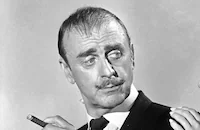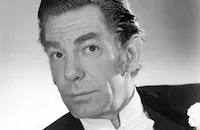The Boys From Brazil

Brief Synopsis
Cast & Crew
Franklin J. Schaffner
Gregory Peck
Laurence Olivier
James Mason
Lilli Palmer
Uta Hagen
Film Details
Technical Specs
Synopsis
A battle of wits between Nazi war criminal Josef Mengele and Nazi hunter Ezra Lieberman in which Mengele plans to harvest hundreds of young men in an attempt to replicate Hitler's genetic structure.
Director

Franklin J. Schaffner
Cast

Gregory Peck

Laurence Olivier

James Mason

Lilli Palmer
Uta Hagen

Steve Guttenberg

Denholm Elliott
Rosemary Harris

John Dehner
John Rubinstein
Anne Meara
Jeremy Black
Bruno Ganz
Walter Gotell
David Hurst

Wolfgang Preiss

Michael Gough
Joachim Hansen
Guy Dumont
Carl Duering
Linda Hayden
Richard Marner
Georg Marischka
Gunter Meisner
Prunella Scales
Paul Faustino Saldanha
Jurgen Andersen
Mervyn Nelson
David Brandon
Monica Gearson
Wolf Kahler
Gerti Gordon
Guida Decarlo
Crew
Renate Arbes
Del Baker
Derek Ball
Derek Ball
Bill Barringer
Don Bassman
Arie Bohrer
Rebecca Breed
Derek Bromhall
Bert Cann
Pamela Carlton
Ron Carr
Tony Cerbone
Terry Churcher
Ronnie Cogan
Jack Coggins
Colin Davidson
Henri Decae
Jimmy Devis
Vernon Dixon
Hunt Downs
Len Engel
Paul Esposito
Ann Ford
Robert Fryer
Michael Ginsburg
Jerry Goldsmith
Jerry Goldsmith
Alixe Gordin
Heywood Gould
Pat Grant
William Hartman
William Hartman
Theodore Hauser
Stephen Hendrickson
Stephen Hendrickson
Dewi Humphries
Ed Irvins
Mike Jordan
Peter Lamont
Peter Lancaster
Ira Levin
Bill Lodge
Jose Lopez Rodero
Marcella Markham
Godfrey Marks
Godfrey Marks
Anthony Mendleson
Dieter Meyer
Arthur Morton
Frederick Muller
Michael Murchan
Ken Nightingall
Francis Nugent
Stanley O'toole
Tish Oulman
Richard Overton
Elaine Paige
Gil Parrondo
Cecilia Peck
Fernando Pessa
Simone Pessa
Richard Pointing
Dinny Powell
Eddie Powell
Bob Puglisi
David Quintas
Thomas Ricabona
Martin Richards
Mary Richards
Edward Rossi
Edward Rossi
John Sargent
Jenny Schaffner
Ilse Schwarzwald
Joao Severino
Hal Shaper
Maude Spector
Richard Sperber
Richard Sperber
Robert Swink
Christopher Tucker
Marijan Vajda
Jean Walter
Richard Weaver
Roy Whybrow
Scott Wodehouse
Dennis Wooley
Photo Collections
Film Details
Technical Specs
Award Nominations
Best Actor
Best Editing
Best Music Original Dramatic Score
Articles
The Boys From Brazil
Based on Ira Levin's best-selling novel, The Boys from Brazil concerns itself with the fictional post-War activities of Mengele, who in real life was alive and hiding in Sao Paolo, Brazil when the film was produced. Mengele, of course, was the sadistic physician who performed unfathomably hideous experiments on thousands of unwilling subjects who were under his "care" at Auschwitz. (In one of the 20th century's cruelest twists of fate, The Angel of Death was never captured and tried for his horrendous crimes.)
In Levin's story, Mengele is being pursued by an aging Nazi-hunter named Ezra Lieberman (Laurence Olivier, who had just finished portraying a Mengele-like character in Marathon Man, 1976). Mengele's...um...rather outrageous goal, is to raise hundreds of Hitler clones in the same type of social environment where the Fuhrer grew up. This, he hopes, will generate another little Hitler, who will eventually re-start the Wermacht and achieve world domination. Lieberman wants to capture Mengele before this happens, although you might think it would be easier to simply sit back and let the ridiculous plot fail.
Although James Mason is solid as one of Mengele's assistants, the moments featuring Peck and Olivier together crackle with the excitement of two legends knowingly chewing the scenery. Both performers worked extensively on their German accents, not that Olivier needed as much help as Peck did. Dialogue coach Bob Easton worked with Peck for six weeks before they were happy with his speech patterns.
Peck said of Olivier, "He was gallant, funny, easy to be with. Not at all intimidating to others." Olivier, for his part, stated that he appreciated Peck's professionalism both in front of and behind the cameras.
It's interesting to note that Peck, who seemed so casual on-screen, regularly brought his work home with him. He carried pictures of Mengele in his wallet for twisted inspiration, and his family got used to his overplaying the doctor around the house for a few dark laughs. He would even bark at his wife to serve him dinner and drinks, at which point she would click her heals and quickly respond to the order. As for the real Mengele, Peck said at the time, "I think we'd welcome him showing up and trying to sue us for libel." Now that would have been a publicity coup!
Producer: Robert Fryer, Stanley O'Toole, Martin Richards
Director: Franklin J. Schaffner
Screenplay: Ira Levin (novel), Heywood Gould
Cinematography: Henri Decae
Film Editing: Robert Swink
Art Direction: Peter Lamont, Julian Mateos
Music: Jerry Goldsmith
Cast: Gregory Peck (Dr. Josef Mengele), Laurence Olivier (Ezra Lieberman), James Mason (Eduard Seibert), Lilli Palmer (Esther Lieberman), Uta Hagen (Frieda Maloney), Steve Guttenberg (Barry Kohler).
C-123m. Letterboxed.
by Paul Tatara

The Boys From Brazil
Quotes
Trivia
When this movie was being made, the real Josef Mengele was still alive in Sao Paolo, Brazil. He died in 1979, shortly after the movie's release.
Miscellaneous Notes
Released in United States Fall October 5, 1978
Released in United States on Video October 5, 1989
Re-released in United States on Video January 5, 1994
Previously distributed by CBS/Fox Video.
Completed production September 1977.
Released in United States Fall October 5, 1978
Released in United States on Video October 5, 1989
Re-released in United States on Video January 5, 1994














